2022年中考英语总复习语法专题--介词讲义与习题(word版)
文档属性
| 名称 | 2022年中考英语总复习语法专题--介词讲义与习题(word版) | 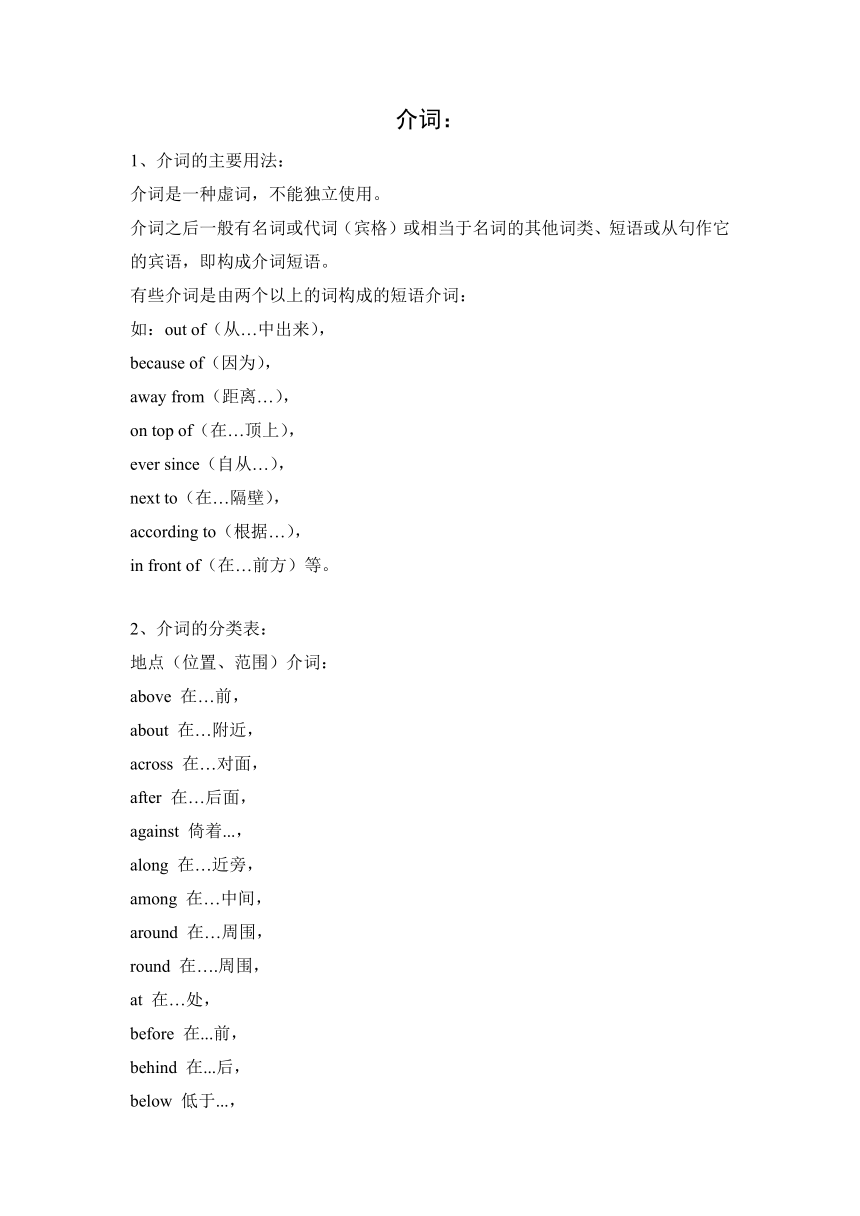 | |
| 格式 | docx | ||
| 文件大小 | 31.5KB | ||
| 资源类型 | 教案 | ||
| 版本资源 | 通用版 | ||
| 科目 | 英语 | ||
| 更新时间 | 2022-01-19 09:04:03 | ||
图片预览

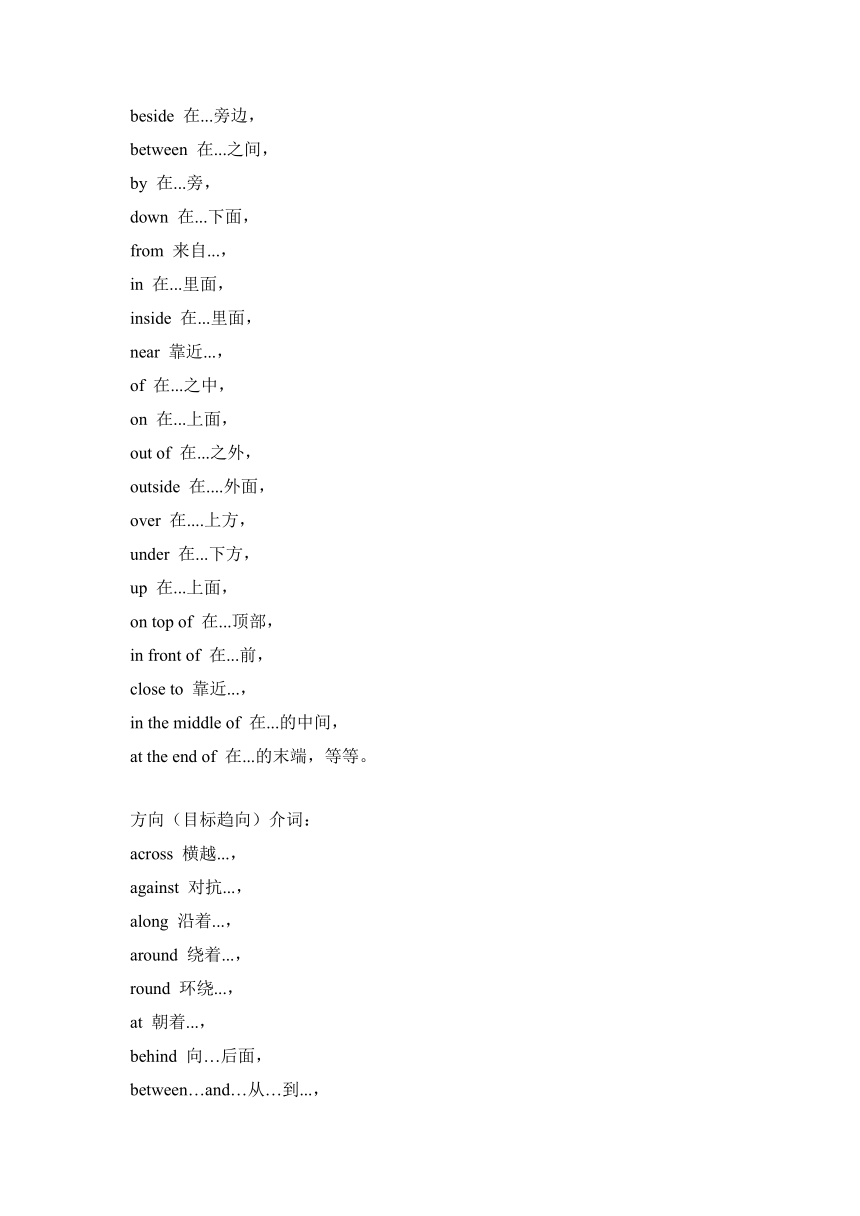
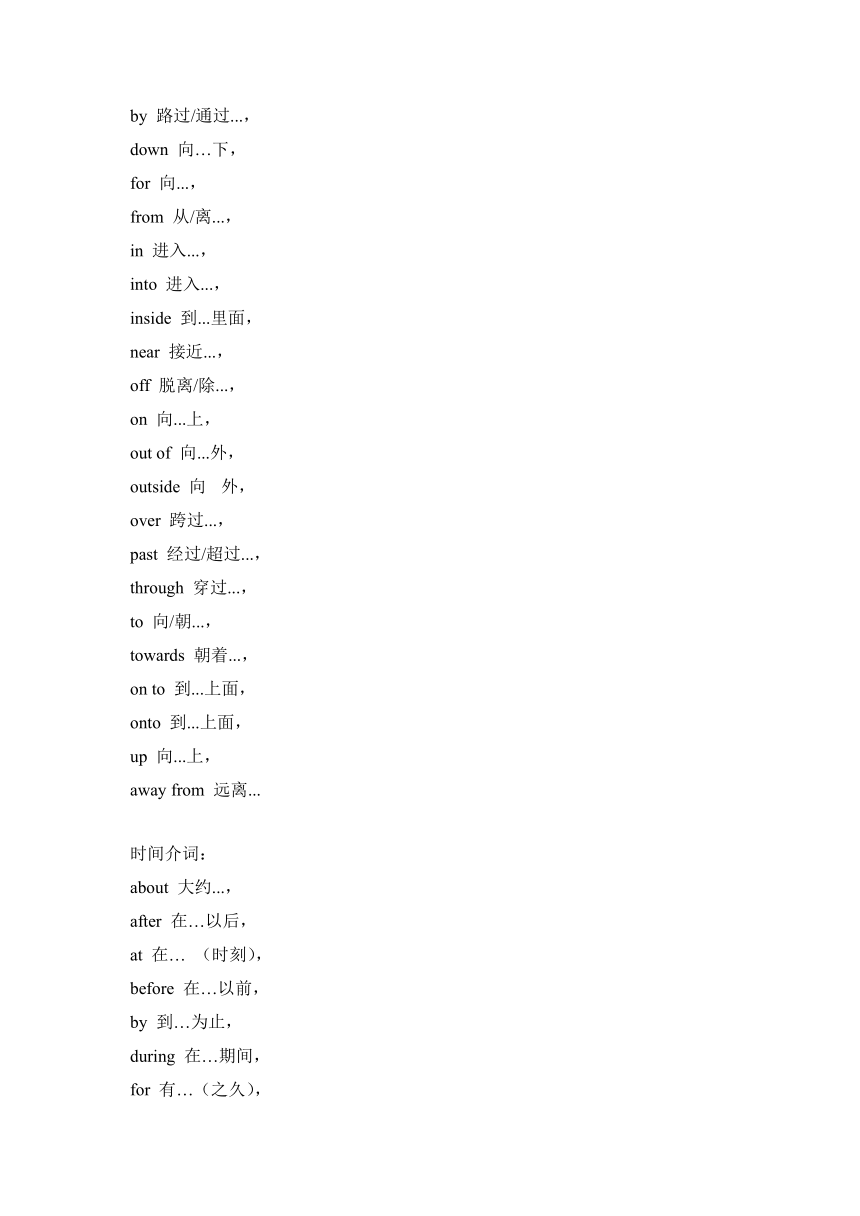
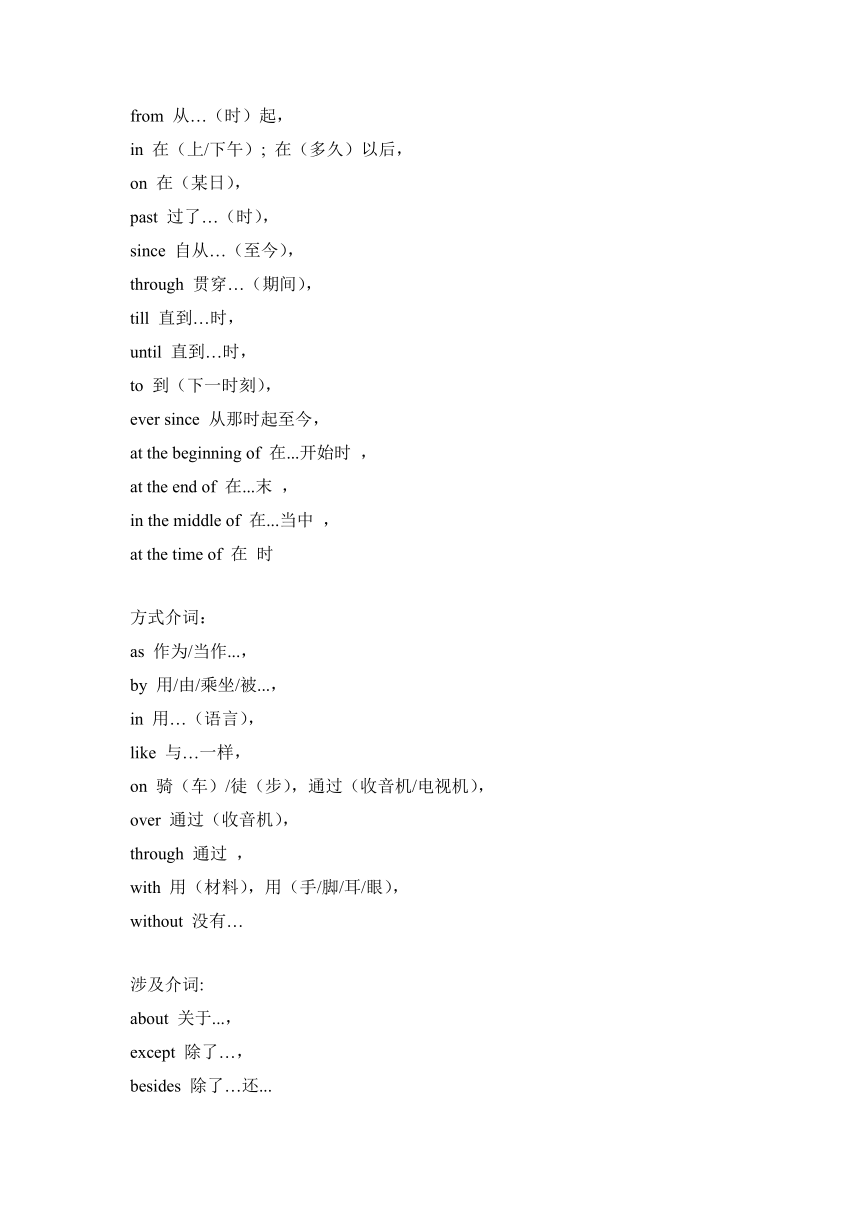
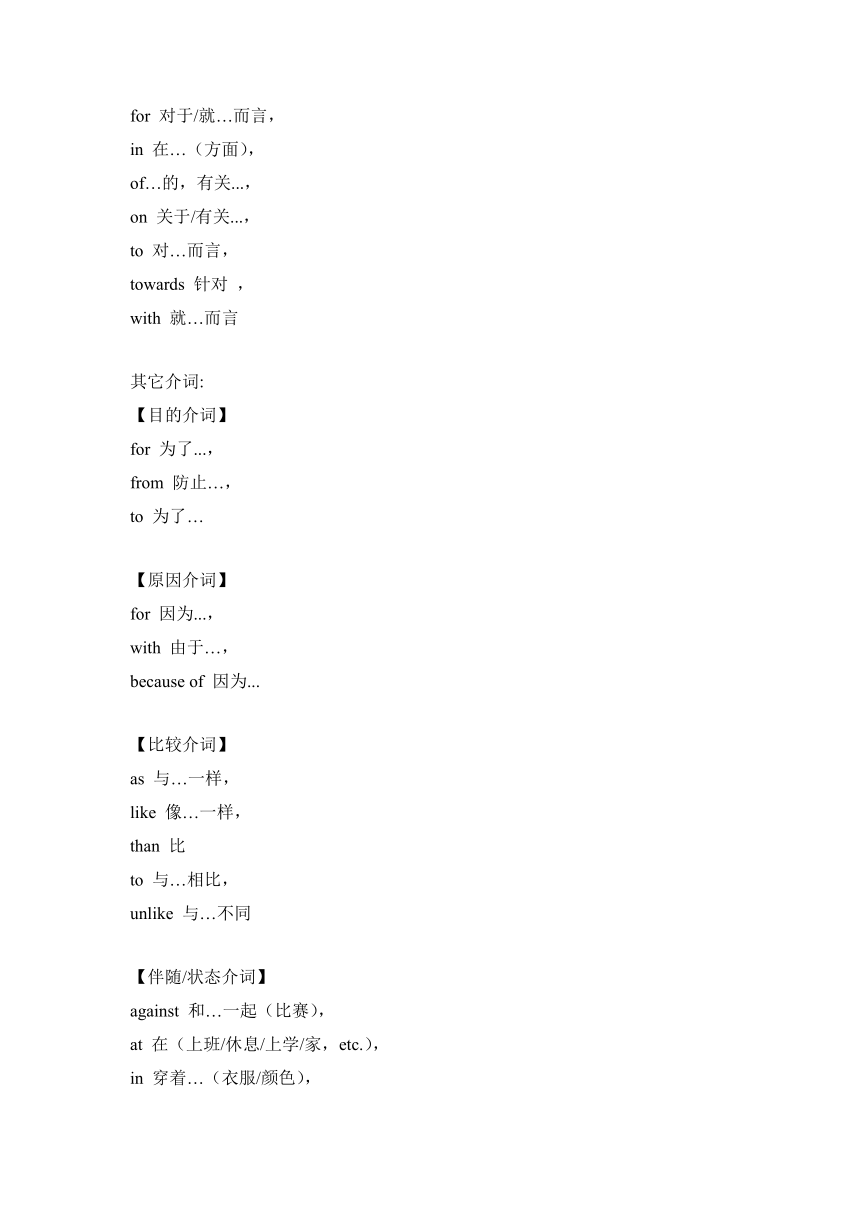
文档简介
介词:
1、介词的主要用法:
介词是一种虚词,不能独立使用。
介词之后一般有名词或代词(宾格)或相当于名词的其他词类、短语或从句作它的宾语,即构成介词短语。
有些介词是由两个以上的词构成的短语介词:
如:out of(从…中出来),
because of(因为),
away from(距离…),
on top of(在…顶上),
ever since(自从…),
next to(在…隔壁),
according to(根据…),
in front of(在…前方)等。
2、介词的分类表:
地点(位置、范围)介词:
above 在…前,
about 在…附近,
across 在…对面,
after 在…后面,
against 倚着...,
along 在…近旁,
among 在…中间,
around 在…周围,
round 在….周围,
at 在…处,
before 在...前,
behind 在...后,
below 低于...,
beside 在...旁边,
between 在...之间,
by 在...旁,
down 在...下面,
from 来自...,
in 在...里面,
inside 在...里面,
near 靠近...,
of 在...之中,
on 在...上面,
out of 在...之外,
outside 在....外面,
over 在....上方,
under 在...下方,
up 在...上面,
on top of 在...顶部,
in front of 在...前,
close to 靠近...,
in the middle of 在...的中间,
at the end of 在...的末端,等等。
方向(目标趋向)介词:
across 横越...,
against 对抗...,
along 沿着...,
around 绕着...,
round 环绕...,
at 朝着...,
behind 向…后面,
between…and…从…到...,
by 路过/通过...,
down 向…下,
for 向...,
from 从/离...,
in 进入...,
into 进入...,
inside 到...里面,
near 接近...,
off 脱离/除...,
on 向...上,
out of 向...外,
outside 向 外,
over 跨过...,
past 经过/超过...,
through 穿过...,
to 向/朝...,
towards 朝着...,
on to 到...上面,
onto 到...上面,
up 向...上,
away from 远离...
时间介词:
about 大约...,
after 在…以后,
at 在… (时刻),
before 在…以前,
by 到…为止,
during 在…期间,
for 有…(之久),
from 从…(时)起,
in 在(上/下午); 在(多久)以后,
on 在(某日),
past 过了…(时),
since 自从…(至今),
through 贯穿…(期间),
till 直到…时,
until 直到…时,
to 到(下一时刻),
ever since 从那时起至今,
at the beginning of 在...开始时 ,
at the end of 在...末 ,
in the middle of 在...当中 ,
at the time of 在 时
方式介词:
as 作为/当作...,
by 用/由/乘坐/被...,
in 用…(语言),
like 与…一样,
on 骑(车)/徒(步),通过(收音机/电视机),
over 通过(收音机),
through 通过 ,
with 用(材料),用(手/脚/耳/眼),
without 没有…
涉及介词:
about 关于...,
except 除了…,
besides 除了…还...
for 对于/就…而言,
in 在…(方面),
of…的,有关...,
on 关于/有关...,
to 对…而言,
towards 针对 ,
with 就…而言
其它介词:
【目的介词】
for 为了...,
from 防止…,
to 为了…
【原因介词】
for 因为...,
with 由于…,
because of 因为...
【比较介词】
as 与…一样,
like 像…一样,
than 比
to 与…相比,
unlike 与…不同
【伴随/状态介词】
against 和…一起(比赛),
at 在(上班/休息/上学/家,etc.),
in 穿着…(衣服/颜色),
into 变成...,
on 在(值日),
with 与…一起,有/带着/长着 ,
without 没有/无/不与…一起
3、介词短语的句法作用:
介词短语相当于一个形容词或副词,可用作状语、定语和表语。
如:The man came down the stairs.
(状)(那个人走下楼来)
The woman with a flower on her head is from the countryside.
(定)(头上戴花的妇女来自乡下)
The teacher is now with the pupils.
(表)(老师现在和学生在一起)
4、介词短语在句子中的位置:
介词短语作状语时,
如果表示时间/地点,可以放在句首或句尾,
如果表示方向/方式/伴随/涉及/原因/目的/比较,一般放在句尾;
介词短语作表语时放在连系动词之后;
介词短语作定语时,只能放在被修饰的名词之后。
如:
He wanted to find a good job in Shanghai the next year. (状语)
(他想来年在上海找份好工作)
They searched the room for the thief.
(他们在房间里搜索小偷)
The letters are for you. (表语)
(信是给你的)
Have you seen a cat with a black head and four white legs (定语)
(你看见一只黑头白腿的猫了吗?)
5、重要注释:
⑴ this / that / these / those / last / next / a / every / each 等词构成的时间短语,前面不用任何介词。
如:Every year travellers from abroad come to visit Pingyao.
(每年都有国外的游客来游览平窑镇)
He had a bad cold that week.
(那个星期他患重感冒)
⑵ for 有时用来引出动词不定式的逻辑主语,常翻译成“对于…而言”。
如:It’s too hard for me to finish the work in only one hour.
(让我在区区一个小时内完成这项工作太难了)
The house is big enough for 10 men to live in.
(房子够大的可以容 10 个人住)
⑶ of 有时用来表示后面的人物正好是前面的表语的逻辑主语。
如:It’s very nice/kind of you to do so.
(你这么做真是太好了)
⑷ 介词有时会与它的宾语分离,而且宾语前置。
① 当宾语是疑问词时。
Who are you talking about
(你们在谈论谁?)
② 宾语在从句中当连接词时。
He has a younger brother who he must take good care of.
(他有 一个需要他照顾的小弟。)
Do you know who our teacher is talking with over there
(你知道我们的老师在那边和什么人谈话吗?)
③ 动词不定式作定语且该动词为不及物动词,后面有介词。
I finally found a chair to sit on.
(我最终找到了一张椅子坐。)
(5) 记住一些固定词组:
arrive at/in(到达…),
on foot(步行),
not…at all(根本不),
to the north of(在…以北),
in the east of(在…的东部),
in the night(在夜间),
at night(在晚上),
be afraid of(害怕…),
be full of(充满/ 装满….),
be filled with(充满/ 装满….),
be good/bad for(对…有益/有害),
be made of(由…做成),
be made from(由…制造),
play with(玩耍……),
look out of(朝…外面看),
at the end of(在…末梢/结束时),
by the end of(不迟于…/到…末为止),
with the help of 或 with one’ s help(在…的帮助下),
look after(照料…),
look for(寻找…),
on a bike(=by bike)骑车,
help sb. with(帮某人做…),
get on (well) with(与某人相处[融洽]),等等。
6、某些介词的用法辨析:
⑴ 时间或地点介词 in、on、at 的用法区别:
表示时间时,
in 表示在一段时间里(在将来时句子中则表示在一段时间之后),
on 表示在具体的某一天或者某天的上下午等,
at 表示在某个时刻或者瞬间;
表示地点时,
in 表示在某个范围之内,
on 表示在某个平面上或与一个面相接触,
at 则表示在某个具体的场所或地点。
如:He was born on the morning of May 10th.
(他出生于五月十日的早晨)
I usually get up at 7:00 in the morning.
(我通常在早上的七点钟起床)
His glasses are right on his nose.
(他的眼镜就架在他的鼻子上)
He is at the cinema at the moment.
(此刻他正在电影院)
⑵ after 与 in 表示时间的用法区别:
“after+(具体时刻/从句)”表示“在…时刻之后”常用于一般时态;
“in+(一段时间)”表示“在(多久)之后”,常用于将来时态。
如:He said that he would be here after 6:00.
(他说他六点钟之后会来这儿)
My father is coming back from England in about a month.
(我父亲大约一个月以后从英国回来)
⑶ since 与 for 表示时间的用法区别:
“since+(具体时刻/that-从句)”表示“自从…起一直到现在”,
“for +(一段斶间)”表示“总共有…之久”,都常用于完成时态;
如:Uncle Li has worked in this factory since 1970.
(李叔叔自从1970 年起就在这家工厂工作了)
Uncle Li has worked in this factory for over 30 years.
(李叔叔在这家工厂已经工作了 30 多年)
⑷ by、in 与 with 表示方式的用法区别:
都可以表示“工具、手段”,但是 by 主要表示“乘坐”某个交通工具或“以……方式”,在被动句中可以表示动作的执行者;
in 表示“使用”某种语言/文字,
with 表示“使用”某个具体的工具、手段。
如:We see with our eyes and walk with our feet.
(我们用眼睛看东西, 用双脚走路)
Please write that article(文章) in English.
(请你用英语写那篇文章)
Let’s go to the zoo by taxi.
(我们打的去动物园吧。)
It was written by Lao She.
(那是老舍写的)
⑸ about 与 on 的用法区别:
都可以表示“有关…”,
但是 about 的意义比较广,
而on 主要表示“有关…(专题/课程)”。
如:Tom is going to give a talk on the history of America.
(汤姆要作一个美国历史的报告)
They are very excited talking about the coming field trip.
(他们兴致勃勃地谈论着即将来到的野外旅游)
⑹ through 与 across、over 的用法区别:
through 指“穿过…(门洞/人群/树林)”;
across 和 over 可以指“跨越…(街道/河流)”,可互换,但是表示“翻过…”时只能用 over.
如:Just then a rat (鼠)ran across the road.
(就在那时一只老鼠跑过路面)
There is a bridge across/over the river.
(河上有座桥)
They climbed over the mountain and arrived there ahead of time.
(他们翻过大山提前到达了那里)
The visitors went through a big gate into another park.
(参观者们穿过一个大门来到另一个公园)
(7) as 与 like 的区别:
两个词都表示“像……”,但是 as 译为“作为……”,表示的是职业、职务、作用等事实,
而 like 译为“像……一样”,表示外表,不是事实。
如:Let me speak to you as a father.
(我以父亲的身份和你讲话。)
(说话者是听者的父亲)
Let me speak to you like a father.
(让我像一位父亲一样和你讲话)
(说话者不是听者的父亲)
(8) at the end of、by the end of、to the end、in the end 的用法区别:
at the end of…既可以表示时间也可以表示地点,译为“在…末;在…尽头”,常与过去时连用;
by the end of…只能表示时间,译为“在…前;到…为止”,常用于过去完成时;
in the end 与at last 基本等义,表示“终于、最后”,通常用于过去时;
to the end 译为“到…的终点为止”,前面往往有表示运动或连续性的动词。
如:By the end of last term we had learned 16 units of Book III.
(到上学期期末我们已经学习了第三册 16 个单元)
At the end of the road you can find a big white house with brown windows.
(在路的尽头你能找到一幢有棕色窗户的白房子)
They left for Beijing at the end of last week.
(上周末他们动身去了北京)
In the end he succeeded in the final exams.
(他最终在期末考试中考及格了)
We should go on with the work to the end.
(我们应该把工作干到底)
Follow this road to the end and you will see a post office.
(沿这条路走到底就能看见一家邮电局)
(9) for a moment、for the moment、in a moment、at the moment 的区别:
for a moment“一会儿、片刻”(=for a while),常与持续性动词连用;
for the moment “暂时、目前”,常用于现在时;
in a moment“一会儿、立即、马上”(=soon; in a few minutes),一般用于将来时;
at the moment“此刻,眼下”(=now),用于现在进行时。
如:Please wait for a moment.
(请稍等)
Let’s leave things as they are for the moment.
(暂时就维持现状吧!)
I’ll come back in a moment.
(我过会儿回来)
I am very busy at the moment.
(眼下我很忙)
(10) but 的问题:用介词but 引出另一个动词时,要注意:如果前面有do,后面就用原形动词,前面没有do 时,后面的动词要加to。
如:I could do nothing but wait.
(我什么也做不了只能等)
They had no choice(选择) but to fight.
(他们没有选择只有战斗)
(11) in front of 与 in the front of:
in front of“在…的前面”,
in the front of“在…的前部”。
如:A car was parking in front of the hall.
(大厅跟前停着一辆汽车)
In the front of the hall stood a big desk.
(大厅前部立着一个大讲台)
(12) except 与 besides 的区别:
except“除了”,表示排除掉某人物,即不包含;
而 besides“除了”则表示包含,即“不仅……又……”。
如:Everyone went to the Palace Museum except Tom.
(除了Tom,大家都去了故宫博物院)(Tom 没有去故宫)
Besides Chinese he also studied many other subjects.
(除了汉语之外,他还学其他许多功课)(“汉语”也是他学的功课之一)
介词
姓名:___________学号:___________
一、单项选择
1.(2021·山东青岛·中考真题)Qingdao Jiaozhou Bay Bridge ________ the sea helps people travel conveniently.
A.over B.by C.in D.or
2.(2021·江苏淮安·中考真题)—What time does the library open in the morning
—It opens ________ 9 a.m.
A.in B.on C.at D.between
3.(2021·黑龙江哈尔滨·中考真题)We’ll celebrate the 100th birthday of the Chinese Communist Party(中国共产党) July 1st this year.
A.in B.on C.at
4.(2021·广西柳州·中考真题)—Does the method you thought of ________ the problem make any sense
—Of course.
A.solve B.of solving C.solving
5.(2021·广西桂林·中考真题)There is a new TV ________ the wall.
A.at B.of C.on
6.(2021·辽宁大连·中考真题)I often do volunteer work in the library ________ Sundays.
A.at B.in C.on D.for
7.(2021·广西百色·中考真题)The Communist Party of China was founded________ July 1st, 1921.
A.in B.on C.at D./
8.(2021·山东临沂·中考真题)We’ll have a class meeting ________ 3:30 this afternoon.
A.in B.on C.at
9.(2021·江苏宿迁·中考真题)The Communist Party of China will have its 100th birthday ________ July 1st, 2021.
A.in B.on C.for D.at
10.(2021·四川凉山·中考真题)The Communist Party of China was set up ________ July, 1921 and we will celebrate her 100th birthday this year.
A.on B.at C.in D.by
11.(2021·黑龙江绥化·中考真题)Big sale! We have T-shirts _________white _________only $6.
A.in; for B.of; for C.in; at
12.(2021·黑龙江绥化·中考真题)The pink hair band must belong to ________.
A.Linda’s B.Linda C.hers
13.(2021·海南·中考真题)Sansha, a beautiful city, lies ________ the south of china.
A.in B.on C.to
14.(2021·贵州贵阳·中考真题)In order to protect the environment, many people choose to go to work _________ subway.
A.in B.on C.by
15.(2021·北京·中考真题)Space Day of China falls ________ April 24th every year.
A.on B.by C.at D.in
16.(2021·湖北十堰·中考真题)— Where’s the People’s Park
— Go along Gongyuan Road, turn right at the second crossing and it’s _________ your left.
A.on B.to C.at D.in
17.(2021·青海·中考真题)Look! The sun is shining directly into the car. You’d better park it ________ the tree.
A.under B.in front of C.behind
18.(2021·湖南怀化·中考真题)I often help my parents with housework ______ Sundays.
A.on B.in C.at
19.(2021·江苏南京·中考真题)We are going to celebrate the 100th anniversary of the founding of the Communist Party of China ________ July 1st, 2021.
A.in B.on C.at D.of
20.(2021·天津·中考真题)Anna is taller than me. She sits ________ me in the classroom.
A.between B.from C.behind D.among
21.(2021·江苏扬州·中考真题)China’s first Mars rover, Zhurong, touched down on the Red Planet _______ May 15, 2021.
A.on B.in C.at D.to
22.(2021·四川成都·中考真题)It is hard for people to move forward with a strong wind ________ hard.
A.blown B.blowing C.to blow
23.(2021·江苏连云港·中考真题)The Communist Party of China will have its 100th birthday ________ July 1st, 2021.
A.in B.at C.on D.around
24.(2021·重庆·中考真题)The Tianwen-1 Probe landed on Mars ________ May 15th, 2021.
A.at B.in C.to D.on
二、根据首字母填空
25.(2021·四川眉山·中考真题)The little girl is so shy that she always hides herself b________ her mother when meeting a stranger.
26.(2021·江苏苏州·中考真题)A________the four great classical Chinese novels, my favourite is Journey to the West.
27.(2021·四川南充·中考真题)I guess the temperature is b________ zero because it’s freezing here.
三、根据汉语提示填空
28.(2021·江苏镇江·中考真题)—Excuse me, where is the railway station
—Go straight on, it’s just ________ (在……对面) Wanda Plaza.
29.(2021·江苏常州·中考真题)Everyone _________ (除了) me has seen Hi, Mom, so I’ll go to see it today.
30.(2021·山东日照·中考真题)There is a car park _________ (对面) the hotel.
31.(2021·江苏盐城·中考真题)The app about how to learn Chinese is very popular ________ the foreigners.(在……当中)
32.(2021·江苏扬州·中考真题)There is a low brick wall _______ the garden and the field beyond.(在……之间)
参考答案
1.A
【详解】
句意:青岛胶州湾跨海大桥为人们出行提供了便利。
考查介词辨析。over在……上面;by通过;in在……里面;or或者。根据“Bridge”和“the sea”的关系可知,桥在海面之上,因此over符合句意。故选A。
2.C
【详解】
句意:——上午图书馆什么时间开?——上午九点开门。
考查介词。in 用于表示世纪、年、月、季节,在上午或下午等;on用于表示确定的时间,具体某天或具体某一天的上午下午晚上或一般节日等;at表示在具体的时间点,常用于表示钟点、夜里、中午、拂晓等的词组中;between指在二者之间。根据“9 a.m.”可知表达的是具体的时间九点钟。用介词“at”。故选C。
3.B
【详解】
句意:今年7月1日我们将庆祝中国共产党成立100周年。
考查时间介词辨析。in后接某年某月某季节;on后接具体某一天;at后接具体时刻。根据“July 1st”可知,此处指具体的时间,故选B。
4.B
【详解】
句意:—你想出的解决这个问题的方法有意义吗?——当然。
考查短语及非谓语动词。句中“you thought of”是后置定语,修饰“the method”,此处用the method of doing sth.结构表示“做某事的方法”,the method (you thought of) of solving the problem(你想出的)解决这个问题的方法。故选B。
5.C
【详解】
句意:墙上有一台新电视。
考查介词辨析。at在;of……的;on在……上面。根据“... the wall”可知电视在墙上,on the wall在墙上(表面上)。故选C。
6.C
【详解】
句意:星期天我经常在图书馆做义工。
考查时间介词辨析。at用于具体的钟点前;in用于年、月、季节前;on用于具体的某一天前;for后接一段时间;Sundays指具体的星期,前面要用介词on,故选C。
7.B
【详解】
句意:中国共产党成立于1921年7月1日。
考查介词。in 通常用于年月,季节等词前;on通常用于星期,节日或具体的某一天前;at通常用于钟点,中午夜晚或某些固定短语中。空后是具体的某一天,所以用on。故选B。
8.C
【详解】
句意:今天下午三点半我们要开班会。
考查时间介词用法。in后接某年某月;on后接具体一天;at后接具体时刻。“3:30”是具体的时刻,故选C。
9.B
【详解】
句意:中国共产党将于2021年7月1日迎来100岁生日。
考查介词辨析。in用于年/月/季节等泛指的时间前;at用于具体的钟点前;on用于具体的某一天前;for后接一段时间;根据“July 1st, 2021”可知,具体的一天前用介词on,故选B。
10.C
【详解】
句意:中国共产党是1921年7月成立的,今年我们将庆祝她的100岁生日。
考查时间介词辨析。on后接具体某一天;at后接具体时刻;in后接某年某月某季节;by到……之前。“July”是七月份,用时间介词in,故选C。
11.A
【详解】
句意:大减价!我们有白色的T恤只卖6美元。
考查介词辨析。in后接某种颜色的衣服;for以……价格;at在。根据“…white …only $6”可知,白色的T恤只卖6美元,第一空填in,第二空填for,故选A。
12.B
【详解】
句意:这个粉红色的发带一定属于Linda。
考查名词和代词。Linda是一个女孩的名字;Linda’s是名词所有格形式;hers是名词性物主代词,意为“她的”。句中使用了短语belong to…“属于……”,后跟名词或人称代词宾格形式作宾语。故选B。
13.A
【详解】
句意:三沙坐落于中国南部的美丽城市。
考查介词辨析。in在……里面;on相接壤;to一个城市在另一个城市之外。三沙位于中国内部,用介词in。故选A。
14.C
【详解】
句意:为了保护环境,许多人选择乘地铁上班。
考查介词用法。in在……里面;on在……上面;by后接交通工具,表示乘坐……。根据句子结构可知,这里考查交通方式:“by+交通工具”或“in/on+冠词+交通工具”,介词短语;根据“subway”前面没有冠词和形容词性物主代词,可知此处为介词短语by subway“坐地铁”。故选C。
15.A
【详解】
句意:每年的4月24日是中国的“航天日”。
考查介词辨析。on用在星期或具体时间前;by到……为止;at其后加点钟等;in其后加早中晚/月份/年份等。根据“April 24th”可知,此处加具体的时间,故选A。
16.A
【详解】
句意:——人民公园在哪里? ——沿着公园路走,在第二个十字路口右转,它就在你的左边。
考查介词。on(表示方向)在;to到……;at在(某处);in在……里。根据下文“your left”提示,此处表示的是在某个方向上,故应用介词on,故选A。
17.A
【详解】
句意:看!阳光直射在汽车上。你最好把它停在树下。
考查介词辨析。under在……下面;in front of在……前面;behind在……后面。根据“The sun is shining directly into the car.”可知,为了避免阳光直射,要把车停在树下,故选A。
18.A
【详解】
句意:星期天我经常帮父母做家务。
考查介词。on用于具体的某一天前;in用于年/月/季节等泛指的时间前;at用于具体的钟点前;Sundays是具体的一天,应用介词on,故选A。
19.B
【详解】
句意:我们将在2021年7月1日庆祝中国共产党成立100周年。
考查介词辨析。in后加早中晚、季节、月份、年份等;on后加星期、日期;at后加时刻;of……的。根据“July 1st, 2021”可知,此处指具体的某一天,应用on。故选B。
20.C
【详解】
句意:安娜比我高。在教室里她坐在我后面。
考查介词词义辨析。between在……之间(两者);from来自;behind在……后面;among在……之间(三者)。根据“Anna is taller than me.”可知,这里指她坐在我后面,故选C。
21.A
【详解】
句意:中国首个火星探测器“祝融”于2021年5月15日在火星上着陆。
考查介词辨析。on其后加星期或具体的时间;in其后加早中晚/季节/月份/年份等;at其后加时间点等;to到。根据“May 15, 2021”可知,是具体的某一天,故选A。
22.B
【详解】
句意:强风刮得很厉害,人们很难前进。
考查非谓语动词。这里是with的复合结构,with后的宾语wind与动词blow之间是主动关系。所以用现在分词,作伴随状语,故选B。
23.C
【详解】
句意:中国共产党将于2021年7月1日迎来100岁生日。
考查介词辨析。in用于年/月/季节等泛指的时间前;at用于具体的钟点前;on用于具体的某一天前;around周围;根据“July 1st, 2021”可知,具体的一天前用介词on,故选C。
24.D
【详解】
句意:天问一号探测器在2021年5月15日登陆火星。
考查时间介词辨析。at后接具体时刻;in后接某年某月某季节;to到;on后接具体某一天。“May 15th, 2021”是具体的一天,故选D。
25.(b)ehind
【详解】
句意:小女孩如此的害羞,以至于当遇到陌生人时,她总是藏在妈妈后面。根据“The little girl is so shy...”可知女孩害羞,所以遇到陌生人会躲藏在妈妈后面,方位介词behind表示“在……后面”。故填(b)ehind。
26.(A)mong
【详解】
句意:在中国四大古典小说中,我最喜欢的是《西游记》。根据“the our great classical Chinese novels, my favourite is Journey to the West”以及首字母提示可知,此处表示在中国四大古典小说中,Among在……中,介词,用于三者或三者以上。故填Among。
27.(b)elow
【详解】
句意:我猜温度在零度以下,因为这里很冷。根据“it’s freezing here”可知,此处表示“(温度)在……之下”,用below表示,故填(b)elow。
28.opposite
【详解】
句意:——打扰一下,火车站在哪里?——一直往前走,就在万达广场对面。根据中文提示可知,opposite表示“在……对面”,故填opposite。
29.except
【详解】
句意:除了我,每个人都看过《你好,李焕英》,所以我今天要去看。根据“so I’ll go to see it today”可知不包含“我”,“除了”译为except。故填except。
30.opposite
【详解】
句意:旅馆对面有一个停车场。opposite作介词时,意为“在……对面”,故填opposite。
31.among
【详解】
句意:这个关于如何学习汉语的应用程序在外国人中很受欢迎。分析“The app about how to learn Chinese is very popular…the foreigners.”可知,此处表示“在(三者及以上)之间”,用among表示,故填among。
32.between
【详解】
句意:在花园和田野之间有一堵低矮的砖墙。在……之间(两者):between,介词。故填between。
1、介词的主要用法:
介词是一种虚词,不能独立使用。
介词之后一般有名词或代词(宾格)或相当于名词的其他词类、短语或从句作它的宾语,即构成介词短语。
有些介词是由两个以上的词构成的短语介词:
如:out of(从…中出来),
because of(因为),
away from(距离…),
on top of(在…顶上),
ever since(自从…),
next to(在…隔壁),
according to(根据…),
in front of(在…前方)等。
2、介词的分类表:
地点(位置、范围)介词:
above 在…前,
about 在…附近,
across 在…对面,
after 在…后面,
against 倚着...,
along 在…近旁,
among 在…中间,
around 在…周围,
round 在….周围,
at 在…处,
before 在...前,
behind 在...后,
below 低于...,
beside 在...旁边,
between 在...之间,
by 在...旁,
down 在...下面,
from 来自...,
in 在...里面,
inside 在...里面,
near 靠近...,
of 在...之中,
on 在...上面,
out of 在...之外,
outside 在....外面,
over 在....上方,
under 在...下方,
up 在...上面,
on top of 在...顶部,
in front of 在...前,
close to 靠近...,
in the middle of 在...的中间,
at the end of 在...的末端,等等。
方向(目标趋向)介词:
across 横越...,
against 对抗...,
along 沿着...,
around 绕着...,
round 环绕...,
at 朝着...,
behind 向…后面,
between…and…从…到...,
by 路过/通过...,
down 向…下,
for 向...,
from 从/离...,
in 进入...,
into 进入...,
inside 到...里面,
near 接近...,
off 脱离/除...,
on 向...上,
out of 向...外,
outside 向 外,
over 跨过...,
past 经过/超过...,
through 穿过...,
to 向/朝...,
towards 朝着...,
on to 到...上面,
onto 到...上面,
up 向...上,
away from 远离...
时间介词:
about 大约...,
after 在…以后,
at 在… (时刻),
before 在…以前,
by 到…为止,
during 在…期间,
for 有…(之久),
from 从…(时)起,
in 在(上/下午); 在(多久)以后,
on 在(某日),
past 过了…(时),
since 自从…(至今),
through 贯穿…(期间),
till 直到…时,
until 直到…时,
to 到(下一时刻),
ever since 从那时起至今,
at the beginning of 在...开始时 ,
at the end of 在...末 ,
in the middle of 在...当中 ,
at the time of 在 时
方式介词:
as 作为/当作...,
by 用/由/乘坐/被...,
in 用…(语言),
like 与…一样,
on 骑(车)/徒(步),通过(收音机/电视机),
over 通过(收音机),
through 通过 ,
with 用(材料),用(手/脚/耳/眼),
without 没有…
涉及介词:
about 关于...,
except 除了…,
besides 除了…还...
for 对于/就…而言,
in 在…(方面),
of…的,有关...,
on 关于/有关...,
to 对…而言,
towards 针对 ,
with 就…而言
其它介词:
【目的介词】
for 为了...,
from 防止…,
to 为了…
【原因介词】
for 因为...,
with 由于…,
because of 因为...
【比较介词】
as 与…一样,
like 像…一样,
than 比
to 与…相比,
unlike 与…不同
【伴随/状态介词】
against 和…一起(比赛),
at 在(上班/休息/上学/家,etc.),
in 穿着…(衣服/颜色),
into 变成...,
on 在(值日),
with 与…一起,有/带着/长着 ,
without 没有/无/不与…一起
3、介词短语的句法作用:
介词短语相当于一个形容词或副词,可用作状语、定语和表语。
如:The man came down the stairs.
(状)(那个人走下楼来)
The woman with a flower on her head is from the countryside.
(定)(头上戴花的妇女来自乡下)
The teacher is now with the pupils.
(表)(老师现在和学生在一起)
4、介词短语在句子中的位置:
介词短语作状语时,
如果表示时间/地点,可以放在句首或句尾,
如果表示方向/方式/伴随/涉及/原因/目的/比较,一般放在句尾;
介词短语作表语时放在连系动词之后;
介词短语作定语时,只能放在被修饰的名词之后。
如:
He wanted to find a good job in Shanghai the next year. (状语)
(他想来年在上海找份好工作)
They searched the room for the thief.
(他们在房间里搜索小偷)
The letters are for you. (表语)
(信是给你的)
Have you seen a cat with a black head and four white legs (定语)
(你看见一只黑头白腿的猫了吗?)
5、重要注释:
⑴ this / that / these / those / last / next / a / every / each 等词构成的时间短语,前面不用任何介词。
如:Every year travellers from abroad come to visit Pingyao.
(每年都有国外的游客来游览平窑镇)
He had a bad cold that week.
(那个星期他患重感冒)
⑵ for 有时用来引出动词不定式的逻辑主语,常翻译成“对于…而言”。
如:It’s too hard for me to finish the work in only one hour.
(让我在区区一个小时内完成这项工作太难了)
The house is big enough for 10 men to live in.
(房子够大的可以容 10 个人住)
⑶ of 有时用来表示后面的人物正好是前面的表语的逻辑主语。
如:It’s very nice/kind of you to do so.
(你这么做真是太好了)
⑷ 介词有时会与它的宾语分离,而且宾语前置。
① 当宾语是疑问词时。
Who are you talking about
(你们在谈论谁?)
② 宾语在从句中当连接词时。
He has a younger brother who he must take good care of.
(他有 一个需要他照顾的小弟。)
Do you know who our teacher is talking with over there
(你知道我们的老师在那边和什么人谈话吗?)
③ 动词不定式作定语且该动词为不及物动词,后面有介词。
I finally found a chair to sit on.
(我最终找到了一张椅子坐。)
(5) 记住一些固定词组:
arrive at/in(到达…),
on foot(步行),
not…at all(根本不),
to the north of(在…以北),
in the east of(在…的东部),
in the night(在夜间),
at night(在晚上),
be afraid of(害怕…),
be full of(充满/ 装满….),
be filled with(充满/ 装满….),
be good/bad for(对…有益/有害),
be made of(由…做成),
be made from(由…制造),
play with(玩耍……),
look out of(朝…外面看),
at the end of(在…末梢/结束时),
by the end of(不迟于…/到…末为止),
with the help of 或 with one’ s help(在…的帮助下),
look after(照料…),
look for(寻找…),
on a bike(=by bike)骑车,
help sb. with(帮某人做…),
get on (well) with(与某人相处[融洽]),等等。
6、某些介词的用法辨析:
⑴ 时间或地点介词 in、on、at 的用法区别:
表示时间时,
in 表示在一段时间里(在将来时句子中则表示在一段时间之后),
on 表示在具体的某一天或者某天的上下午等,
at 表示在某个时刻或者瞬间;
表示地点时,
in 表示在某个范围之内,
on 表示在某个平面上或与一个面相接触,
at 则表示在某个具体的场所或地点。
如:He was born on the morning of May 10th.
(他出生于五月十日的早晨)
I usually get up at 7:00 in the morning.
(我通常在早上的七点钟起床)
His glasses are right on his nose.
(他的眼镜就架在他的鼻子上)
He is at the cinema at the moment.
(此刻他正在电影院)
⑵ after 与 in 表示时间的用法区别:
“after+(具体时刻/从句)”表示“在…时刻之后”常用于一般时态;
“in+(一段时间)”表示“在(多久)之后”,常用于将来时态。
如:He said that he would be here after 6:00.
(他说他六点钟之后会来这儿)
My father is coming back from England in about a month.
(我父亲大约一个月以后从英国回来)
⑶ since 与 for 表示时间的用法区别:
“since+(具体时刻/that-从句)”表示“自从…起一直到现在”,
“for +(一段斶间)”表示“总共有…之久”,都常用于完成时态;
如:Uncle Li has worked in this factory since 1970.
(李叔叔自从1970 年起就在这家工厂工作了)
Uncle Li has worked in this factory for over 30 years.
(李叔叔在这家工厂已经工作了 30 多年)
⑷ by、in 与 with 表示方式的用法区别:
都可以表示“工具、手段”,但是 by 主要表示“乘坐”某个交通工具或“以……方式”,在被动句中可以表示动作的执行者;
in 表示“使用”某种语言/文字,
with 表示“使用”某个具体的工具、手段。
如:We see with our eyes and walk with our feet.
(我们用眼睛看东西, 用双脚走路)
Please write that article(文章) in English.
(请你用英语写那篇文章)
Let’s go to the zoo by taxi.
(我们打的去动物园吧。)
It was written by Lao She.
(那是老舍写的)
⑸ about 与 on 的用法区别:
都可以表示“有关…”,
但是 about 的意义比较广,
而on 主要表示“有关…(专题/课程)”。
如:Tom is going to give a talk on the history of America.
(汤姆要作一个美国历史的报告)
They are very excited talking about the coming field trip.
(他们兴致勃勃地谈论着即将来到的野外旅游)
⑹ through 与 across、over 的用法区别:
through 指“穿过…(门洞/人群/树林)”;
across 和 over 可以指“跨越…(街道/河流)”,可互换,但是表示“翻过…”时只能用 over.
如:Just then a rat (鼠)ran across the road.
(就在那时一只老鼠跑过路面)
There is a bridge across/over the river.
(河上有座桥)
They climbed over the mountain and arrived there ahead of time.
(他们翻过大山提前到达了那里)
The visitors went through a big gate into another park.
(参观者们穿过一个大门来到另一个公园)
(7) as 与 like 的区别:
两个词都表示“像……”,但是 as 译为“作为……”,表示的是职业、职务、作用等事实,
而 like 译为“像……一样”,表示外表,不是事实。
如:Let me speak to you as a father.
(我以父亲的身份和你讲话。)
(说话者是听者的父亲)
Let me speak to you like a father.
(让我像一位父亲一样和你讲话)
(说话者不是听者的父亲)
(8) at the end of、by the end of、to the end、in the end 的用法区别:
at the end of…既可以表示时间也可以表示地点,译为“在…末;在…尽头”,常与过去时连用;
by the end of…只能表示时间,译为“在…前;到…为止”,常用于过去完成时;
in the end 与at last 基本等义,表示“终于、最后”,通常用于过去时;
to the end 译为“到…的终点为止”,前面往往有表示运动或连续性的动词。
如:By the end of last term we had learned 16 units of Book III.
(到上学期期末我们已经学习了第三册 16 个单元)
At the end of the road you can find a big white house with brown windows.
(在路的尽头你能找到一幢有棕色窗户的白房子)
They left for Beijing at the end of last week.
(上周末他们动身去了北京)
In the end he succeeded in the final exams.
(他最终在期末考试中考及格了)
We should go on with the work to the end.
(我们应该把工作干到底)
Follow this road to the end and you will see a post office.
(沿这条路走到底就能看见一家邮电局)
(9) for a moment、for the moment、in a moment、at the moment 的区别:
for a moment“一会儿、片刻”(=for a while),常与持续性动词连用;
for the moment “暂时、目前”,常用于现在时;
in a moment“一会儿、立即、马上”(=soon; in a few minutes),一般用于将来时;
at the moment“此刻,眼下”(=now),用于现在进行时。
如:Please wait for a moment.
(请稍等)
Let’s leave things as they are for the moment.
(暂时就维持现状吧!)
I’ll come back in a moment.
(我过会儿回来)
I am very busy at the moment.
(眼下我很忙)
(10) but 的问题:用介词but 引出另一个动词时,要注意:如果前面有do,后面就用原形动词,前面没有do 时,后面的动词要加to。
如:I could do nothing but wait.
(我什么也做不了只能等)
They had no choice(选择) but to fight.
(他们没有选择只有战斗)
(11) in front of 与 in the front of:
in front of“在…的前面”,
in the front of“在…的前部”。
如:A car was parking in front of the hall.
(大厅跟前停着一辆汽车)
In the front of the hall stood a big desk.
(大厅前部立着一个大讲台)
(12) except 与 besides 的区别:
except“除了”,表示排除掉某人物,即不包含;
而 besides“除了”则表示包含,即“不仅……又……”。
如:Everyone went to the Palace Museum except Tom.
(除了Tom,大家都去了故宫博物院)(Tom 没有去故宫)
Besides Chinese he also studied many other subjects.
(除了汉语之外,他还学其他许多功课)(“汉语”也是他学的功课之一)
介词
姓名:___________学号:___________
一、单项选择
1.(2021·山东青岛·中考真题)Qingdao Jiaozhou Bay Bridge ________ the sea helps people travel conveniently.
A.over B.by C.in D.or
2.(2021·江苏淮安·中考真题)—What time does the library open in the morning
—It opens ________ 9 a.m.
A.in B.on C.at D.between
3.(2021·黑龙江哈尔滨·中考真题)We’ll celebrate the 100th birthday of the Chinese Communist Party(中国共产党) July 1st this year.
A.in B.on C.at
4.(2021·广西柳州·中考真题)—Does the method you thought of ________ the problem make any sense
—Of course.
A.solve B.of solving C.solving
5.(2021·广西桂林·中考真题)There is a new TV ________ the wall.
A.at B.of C.on
6.(2021·辽宁大连·中考真题)I often do volunteer work in the library ________ Sundays.
A.at B.in C.on D.for
7.(2021·广西百色·中考真题)The Communist Party of China was founded________ July 1st, 1921.
A.in B.on C.at D./
8.(2021·山东临沂·中考真题)We’ll have a class meeting ________ 3:30 this afternoon.
A.in B.on C.at
9.(2021·江苏宿迁·中考真题)The Communist Party of China will have its 100th birthday ________ July 1st, 2021.
A.in B.on C.for D.at
10.(2021·四川凉山·中考真题)The Communist Party of China was set up ________ July, 1921 and we will celebrate her 100th birthday this year.
A.on B.at C.in D.by
11.(2021·黑龙江绥化·中考真题)Big sale! We have T-shirts _________white _________only $6.
A.in; for B.of; for C.in; at
12.(2021·黑龙江绥化·中考真题)The pink hair band must belong to ________.
A.Linda’s B.Linda C.hers
13.(2021·海南·中考真题)Sansha, a beautiful city, lies ________ the south of china.
A.in B.on C.to
14.(2021·贵州贵阳·中考真题)In order to protect the environment, many people choose to go to work _________ subway.
A.in B.on C.by
15.(2021·北京·中考真题)Space Day of China falls ________ April 24th every year.
A.on B.by C.at D.in
16.(2021·湖北十堰·中考真题)— Where’s the People’s Park
— Go along Gongyuan Road, turn right at the second crossing and it’s _________ your left.
A.on B.to C.at D.in
17.(2021·青海·中考真题)Look! The sun is shining directly into the car. You’d better park it ________ the tree.
A.under B.in front of C.behind
18.(2021·湖南怀化·中考真题)I often help my parents with housework ______ Sundays.
A.on B.in C.at
19.(2021·江苏南京·中考真题)We are going to celebrate the 100th anniversary of the founding of the Communist Party of China ________ July 1st, 2021.
A.in B.on C.at D.of
20.(2021·天津·中考真题)Anna is taller than me. She sits ________ me in the classroom.
A.between B.from C.behind D.among
21.(2021·江苏扬州·中考真题)China’s first Mars rover, Zhurong, touched down on the Red Planet _______ May 15, 2021.
A.on B.in C.at D.to
22.(2021·四川成都·中考真题)It is hard for people to move forward with a strong wind ________ hard.
A.blown B.blowing C.to blow
23.(2021·江苏连云港·中考真题)The Communist Party of China will have its 100th birthday ________ July 1st, 2021.
A.in B.at C.on D.around
24.(2021·重庆·中考真题)The Tianwen-1 Probe landed on Mars ________ May 15th, 2021.
A.at B.in C.to D.on
二、根据首字母填空
25.(2021·四川眉山·中考真题)The little girl is so shy that she always hides herself b________ her mother when meeting a stranger.
26.(2021·江苏苏州·中考真题)A________the four great classical Chinese novels, my favourite is Journey to the West.
27.(2021·四川南充·中考真题)I guess the temperature is b________ zero because it’s freezing here.
三、根据汉语提示填空
28.(2021·江苏镇江·中考真题)—Excuse me, where is the railway station
—Go straight on, it’s just ________ (在……对面) Wanda Plaza.
29.(2021·江苏常州·中考真题)Everyone _________ (除了) me has seen Hi, Mom, so I’ll go to see it today.
30.(2021·山东日照·中考真题)There is a car park _________ (对面) the hotel.
31.(2021·江苏盐城·中考真题)The app about how to learn Chinese is very popular ________ the foreigners.(在……当中)
32.(2021·江苏扬州·中考真题)There is a low brick wall _______ the garden and the field beyond.(在……之间)
参考答案
1.A
【详解】
句意:青岛胶州湾跨海大桥为人们出行提供了便利。
考查介词辨析。over在……上面;by通过;in在……里面;or或者。根据“Bridge”和“the sea”的关系可知,桥在海面之上,因此over符合句意。故选A。
2.C
【详解】
句意:——上午图书馆什么时间开?——上午九点开门。
考查介词。in 用于表示世纪、年、月、季节,在上午或下午等;on用于表示确定的时间,具体某天或具体某一天的上午下午晚上或一般节日等;at表示在具体的时间点,常用于表示钟点、夜里、中午、拂晓等的词组中;between指在二者之间。根据“9 a.m.”可知表达的是具体的时间九点钟。用介词“at”。故选C。
3.B
【详解】
句意:今年7月1日我们将庆祝中国共产党成立100周年。
考查时间介词辨析。in后接某年某月某季节;on后接具体某一天;at后接具体时刻。根据“July 1st”可知,此处指具体的时间,故选B。
4.B
【详解】
句意:—你想出的解决这个问题的方法有意义吗?——当然。
考查短语及非谓语动词。句中“you thought of”是后置定语,修饰“the method”,此处用the method of doing sth.结构表示“做某事的方法”,the method (you thought of) of solving the problem(你想出的)解决这个问题的方法。故选B。
5.C
【详解】
句意:墙上有一台新电视。
考查介词辨析。at在;of……的;on在……上面。根据“... the wall”可知电视在墙上,on the wall在墙上(表面上)。故选C。
6.C
【详解】
句意:星期天我经常在图书馆做义工。
考查时间介词辨析。at用于具体的钟点前;in用于年、月、季节前;on用于具体的某一天前;for后接一段时间;Sundays指具体的星期,前面要用介词on,故选C。
7.B
【详解】
句意:中国共产党成立于1921年7月1日。
考查介词。in 通常用于年月,季节等词前;on通常用于星期,节日或具体的某一天前;at通常用于钟点,中午夜晚或某些固定短语中。空后是具体的某一天,所以用on。故选B。
8.C
【详解】
句意:今天下午三点半我们要开班会。
考查时间介词用法。in后接某年某月;on后接具体一天;at后接具体时刻。“3:30”是具体的时刻,故选C。
9.B
【详解】
句意:中国共产党将于2021年7月1日迎来100岁生日。
考查介词辨析。in用于年/月/季节等泛指的时间前;at用于具体的钟点前;on用于具体的某一天前;for后接一段时间;根据“July 1st, 2021”可知,具体的一天前用介词on,故选B。
10.C
【详解】
句意:中国共产党是1921年7月成立的,今年我们将庆祝她的100岁生日。
考查时间介词辨析。on后接具体某一天;at后接具体时刻;in后接某年某月某季节;by到……之前。“July”是七月份,用时间介词in,故选C。
11.A
【详解】
句意:大减价!我们有白色的T恤只卖6美元。
考查介词辨析。in后接某种颜色的衣服;for以……价格;at在。根据“…white …only $6”可知,白色的T恤只卖6美元,第一空填in,第二空填for,故选A。
12.B
【详解】
句意:这个粉红色的发带一定属于Linda。
考查名词和代词。Linda是一个女孩的名字;Linda’s是名词所有格形式;hers是名词性物主代词,意为“她的”。句中使用了短语belong to…“属于……”,后跟名词或人称代词宾格形式作宾语。故选B。
13.A
【详解】
句意:三沙坐落于中国南部的美丽城市。
考查介词辨析。in在……里面;on相接壤;to一个城市在另一个城市之外。三沙位于中国内部,用介词in。故选A。
14.C
【详解】
句意:为了保护环境,许多人选择乘地铁上班。
考查介词用法。in在……里面;on在……上面;by后接交通工具,表示乘坐……。根据句子结构可知,这里考查交通方式:“by+交通工具”或“in/on+冠词+交通工具”,介词短语;根据“subway”前面没有冠词和形容词性物主代词,可知此处为介词短语by subway“坐地铁”。故选C。
15.A
【详解】
句意:每年的4月24日是中国的“航天日”。
考查介词辨析。on用在星期或具体时间前;by到……为止;at其后加点钟等;in其后加早中晚/月份/年份等。根据“April 24th”可知,此处加具体的时间,故选A。
16.A
【详解】
句意:——人民公园在哪里? ——沿着公园路走,在第二个十字路口右转,它就在你的左边。
考查介词。on(表示方向)在;to到……;at在(某处);in在……里。根据下文“your left”提示,此处表示的是在某个方向上,故应用介词on,故选A。
17.A
【详解】
句意:看!阳光直射在汽车上。你最好把它停在树下。
考查介词辨析。under在……下面;in front of在……前面;behind在……后面。根据“The sun is shining directly into the car.”可知,为了避免阳光直射,要把车停在树下,故选A。
18.A
【详解】
句意:星期天我经常帮父母做家务。
考查介词。on用于具体的某一天前;in用于年/月/季节等泛指的时间前;at用于具体的钟点前;Sundays是具体的一天,应用介词on,故选A。
19.B
【详解】
句意:我们将在2021年7月1日庆祝中国共产党成立100周年。
考查介词辨析。in后加早中晚、季节、月份、年份等;on后加星期、日期;at后加时刻;of……的。根据“July 1st, 2021”可知,此处指具体的某一天,应用on。故选B。
20.C
【详解】
句意:安娜比我高。在教室里她坐在我后面。
考查介词词义辨析。between在……之间(两者);from来自;behind在……后面;among在……之间(三者)。根据“Anna is taller than me.”可知,这里指她坐在我后面,故选C。
21.A
【详解】
句意:中国首个火星探测器“祝融”于2021年5月15日在火星上着陆。
考查介词辨析。on其后加星期或具体的时间;in其后加早中晚/季节/月份/年份等;at其后加时间点等;to到。根据“May 15, 2021”可知,是具体的某一天,故选A。
22.B
【详解】
句意:强风刮得很厉害,人们很难前进。
考查非谓语动词。这里是with的复合结构,with后的宾语wind与动词blow之间是主动关系。所以用现在分词,作伴随状语,故选B。
23.C
【详解】
句意:中国共产党将于2021年7月1日迎来100岁生日。
考查介词辨析。in用于年/月/季节等泛指的时间前;at用于具体的钟点前;on用于具体的某一天前;around周围;根据“July 1st, 2021”可知,具体的一天前用介词on,故选C。
24.D
【详解】
句意:天问一号探测器在2021年5月15日登陆火星。
考查时间介词辨析。at后接具体时刻;in后接某年某月某季节;to到;on后接具体某一天。“May 15th, 2021”是具体的一天,故选D。
25.(b)ehind
【详解】
句意:小女孩如此的害羞,以至于当遇到陌生人时,她总是藏在妈妈后面。根据“The little girl is so shy...”可知女孩害羞,所以遇到陌生人会躲藏在妈妈后面,方位介词behind表示“在……后面”。故填(b)ehind。
26.(A)mong
【详解】
句意:在中国四大古典小说中,我最喜欢的是《西游记》。根据“the our great classical Chinese novels, my favourite is Journey to the West”以及首字母提示可知,此处表示在中国四大古典小说中,Among在……中,介词,用于三者或三者以上。故填Among。
27.(b)elow
【详解】
句意:我猜温度在零度以下,因为这里很冷。根据“it’s freezing here”可知,此处表示“(温度)在……之下”,用below表示,故填(b)elow。
28.opposite
【详解】
句意:——打扰一下,火车站在哪里?——一直往前走,就在万达广场对面。根据中文提示可知,opposite表示“在……对面”,故填opposite。
29.except
【详解】
句意:除了我,每个人都看过《你好,李焕英》,所以我今天要去看。根据“so I’ll go to see it today”可知不包含“我”,“除了”译为except。故填except。
30.opposite
【详解】
句意:旅馆对面有一个停车场。opposite作介词时,意为“在……对面”,故填opposite。
31.among
【详解】
句意:这个关于如何学习汉语的应用程序在外国人中很受欢迎。分析“The app about how to learn Chinese is very popular…the foreigners.”可知,此处表示“在(三者及以上)之间”,用among表示,故填among。
32.between
【详解】
句意:在花园和田野之间有一堵低矮的砖墙。在……之间(两者):between,介词。故填between。
同课章节目录
- 词法
- 名词
- 动词和动词短语
- 动词语态
- 动词时态
- 助动词和情态动词
- 非谓语动词
- 冠词
- 代词
- 数词和量词
- 形容词副词及其比较等级
- 介词和介词短语
- 连词和感叹词
- 构词法
- 相似、相近词比较
- 句法
- 陈述句
- 一般疑问句和否定疑问句
- 特殊疑问句及选择疑问句
- 反意疑问句
- 存在句(There be句型)
- 宾语从句
- 定语从句
- 状语从句
- 主谓一致问题
- 简单句
- 并列句
- 复合句
- 主谓一致
- 主、表语从句
- 名词性从句
- 直接引语和间接引语
- 虚拟语气
- 感叹句
- 强调句
- 倒装句
- 祈使句
- 句子的成分
- 句子的分类
- 题型专区
- 单项选择部分
- 易错题
- 完形填空
- 阅读理解
- 词汇练习
- 听说训练
- 句型转换
- 补全对话
- 短文改错
- 翻译
- 书面表达
- 任务型阅读
- 语法填空
- 其他资料
